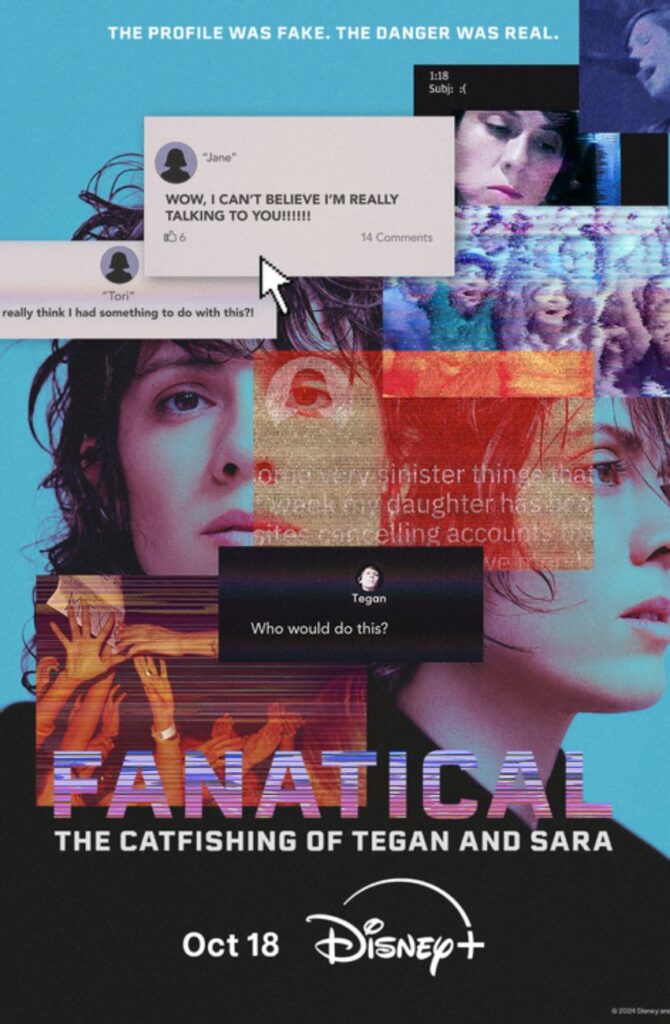
Fanatical: The Catfishing of Tegan and Sara Burrows into Toxic Fandom
Erin Lee Carr’s documentary feels like a YouTube exposé that might have been green-lit by VICE, for better and for worse.
Directed by Erin Lee Carr
by Prabhjot Bains
- Published on
It’s hard to imagine that Canadian twin sister pop duo Tegan and Sara were the victims of an elaborate catfishing plot. After all, they have been loveable trailblazers as openly queer artists who have not only fostered safe spaces for young LGBTQ2+ women—who saw themselves reflected in tunes like “Closer” and “Walking with a Ghost”— but were also known for being highly accessible to their fanbase during social media’s nascency. Yet, Erin Lee Carr’s documentary, Fanatical: The Catfishing of Tegan and Sara, deftly illuminates how those same shimmering qualities made the pair vulnerable to what would become a decades-long catfishing effort.
Fanatical burrows into the depraved depths of toxic fandom, uncovering how one netizen, dubbed “Fegan” (a blend of “Fake” and “Tegan”), exploited the spaces carefully carved out for vulnerable and susceptible queer women by carrying out intimate online conversations with them, sometimes for years at a time. Carr, who appears in the film and confronts suspects herself, embroils viewers in a labyrinthine web of promising leads and dead ends to uncover who “Fegan” truly is, nimbly tracking the case from its inception on internet forums and message boards to its current, ongoing stage—a destination that leaves the film feeling premature. As a result, Fanatical feels like a stylistically neat YouTube or VICE exposé that was rushed out before substantial or biting conclusions could be made. It’s a film that simmers with intensity, but never boils over.
While the title is a slight misnomer, as Tegan’s copied identity is the main point of interest, with Sara barely featuring, Fanatical doubles as a tact portrait of the twosome’s musical journey and ultimate rise as queer icons. Across a collection of interviews with journalists, managers, and superfans, we come to see how the two imbued personality into a mid-2000s music scene defined by generic acts like Smash Mouth and Fall Out Boy, fighting labels like “lesbian folk duo” to become bonafide pop stars.
Carr carefully lays the groundwork to detail how the titular act was able to feed on the dreams, wishes, and newfound openness of people who finally saw themselves as part of a community. As victimized fans detail the direct messages, online romances, and personal information that “Fegan” shared with them, the depth and breadth of the operation quickly begins to stun and overwhelm. Yet, the film’s greatest feat is the level of empathy Carr lends to each victim, highlighting how easy it is to fall for a lie, and how truly exposed we are to the cold hand of the internet.
The most potent and revealing interview revolves around a fan named JT, who refused to believe she wasn’t speaking to the real Tegan and responded by posting disparaging stories about her, a decision that ostracized her from the queer and music spaces she depended upon. Carr unearths the enduring psychological trauma of such events, drawing focus on how an individual’s damaged relationship with an artist and a community can seep into their self-image. Fanatical: The Catfishing of Tegan and Sara stands as a startling showcase for how the terminally online world has transformed fame and fandom in irrevocable ways. But it may have been a more damning one, had it not pulled the trigger on its fascinating story a tad too early.
Fanatical: The Catfishing of Tegan and Sara Streams on Disney+ on Oct. 18.

